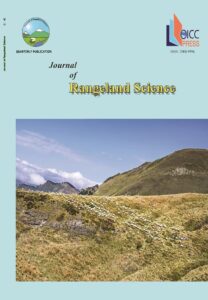Determination of Potential Habitat of Two Rangeland Species in Semi-Desert Area Using GIS (Case Study: Watershed of Kolah Deraz, Qasr-e-Shirin, Iran)
Authors
Abstract
To determine the potential habitat of two rangeland species of Salsola rigida
and Agropyron trichophorum in Qasr-e-Shirin, Iran, Geographic Information Systems
(GIS) and Remote Sensing (RS) techniques were used. At first, several maps (vegetation
cover and land uses maps and thematic maps of various organizations) were collected or
prepared. For digitizing geology, vegetation and conventional states maps, topographic
data layers, soil maps and soil data layers the softwares of ARC/ INFO, ILWIS and
TOSCA were used. Land use map of Qasr-e Shirin city was prepared using IRS1 satellite
imagery. The current habitats of studied species were determined by visiting the area and
limiting it by GPS and marking on map. Three sites for each of species were selected. 10
soil profiles were randomly drilled in depth of 35 cm within each site. The soil parameters
such as EC, Texture, pH and organic matter for each sample were measured. The results
showed that from the total rangeland area (6270 ha), two locations 1677.3 ha (26%) were
fitted for growth of Salsola rigida of which 211 ha (3.36%) from this area belongs to
original habitats and 1466 ha remained, was belong to the potential habitat. For the second
species, the results indicated that two areas totally 1356 ha were habitat of Agropyron
trichophorum which 167 ha (2.66%) were belonged to the current original habitats and the
rest of 1189.8 ha (18.97%) was belonged to the potential habitat for Agropyron
trichophorum.


